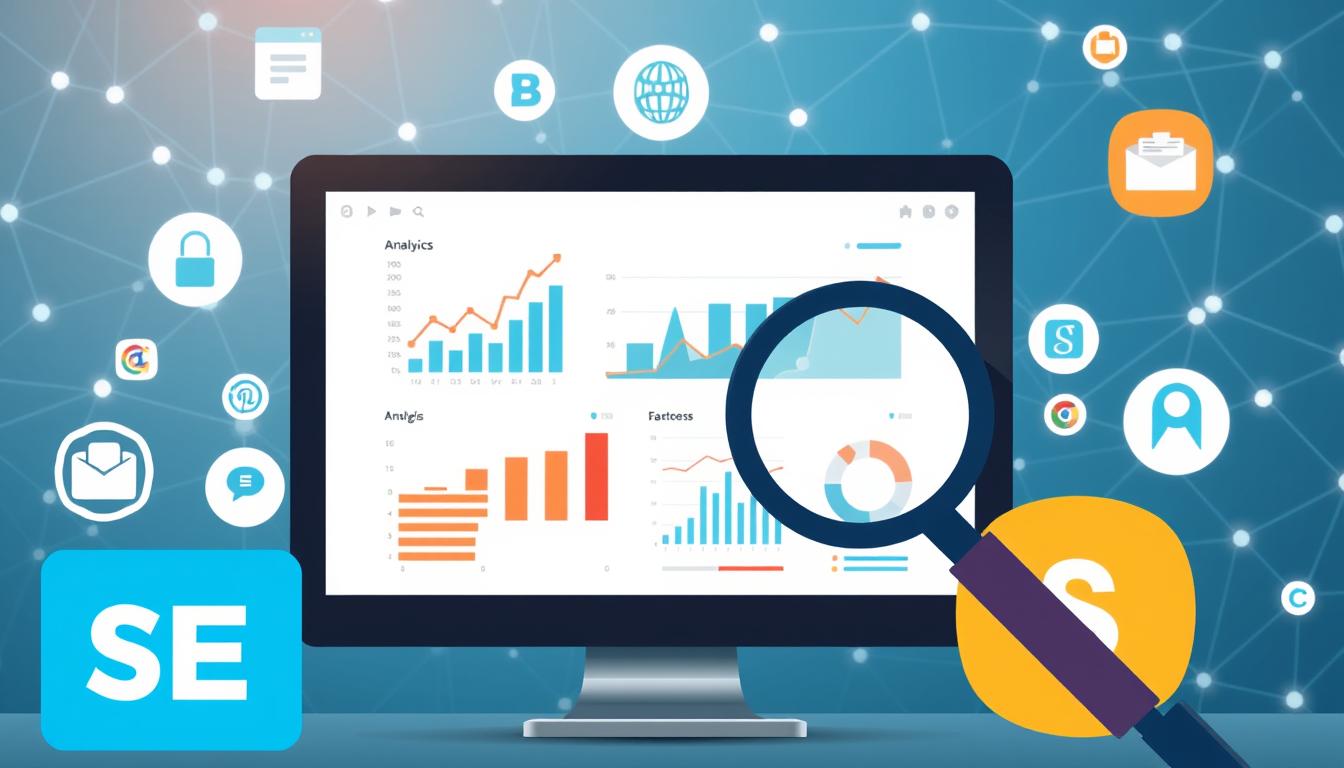What is SEO Analysis? SEO analysis shows how a website stacks up against others online. It looks at content quality, website structure and technical details.
It’s like making a plan with key insights this plan helps navigate through changes in algorithms and trends it aims to improve search rankings.
For businesses online, SEO analysis benefits are huge. It uncovers hidden website performance issues. It finds growth chances and problems to fix.
When done right, it’s key to better user experience. It helps reach and keep an audience interested.
Search engine optimization analytics connects webpages to search engines and businesses to customers. Knowing this connection is crucial. It helps create a digital identity that attracts and keeps an audience.
Why is it Important SEO Analysis for Your Website
Knowing the SEO analysis importance is key for any website owner. A detailed SEO strategy is a must. SEO analysis boosts your website ranking improvement and organic traffic growth.
SEO analysis is important for online marketing success. It’s the foundation for strategic planning. It helps make informed decisions and sets a path that meets your business goals. It shows your strengths and where you need to improve, giving you a clear way to stay ahead.
This ongoing effort to improve your SEO keeps your site up-to-date with search engine changes and user habits. It keeps your site relevant and visible in search results. So, adding regular SEO analysis to your marketing plan is not just a good idea; it’s crucial for lasting online success.
What is SEO Analysis
SEO analysis is a deep look into what makes a website visible in search results. It helps marketers and website owners set their online goals. This way, they can improve their site’s ranking and attract more visitors.
SEO analysis is complex, blending SEO evaluation with a focus on search engine ranking factors. It also involves optimizing websites this means looking at everything from keyword use to site speed. It helps meet search engine standards and user expectations.
Optimizing websites is key in SEO analysis. It means making content better, speeding up sites, and improving how they look. This helps sites meet search engines’ changing rules. SEO analysis is the first step to a strong strategy that boosts online visibility and engagement.
Knowing these basics is crucial for a strategy that talks to search engines and users. A thorough SEO evaluation helps businesses improve their online presence. This leads to better rankings in search results.
Definition and Objective of SEO Analysis
SEO analysis is a detailed review to boost a website’s search engine ranking. It aims to find ways to improve and fix problems that slow it down. With a good SEO audit, businesses can meet their marketing goals and keep up with search engine changes.
Key Components of SEO Analysis
Good SEO analysis covers many important areas of a website. It starts with site architecture, making sure it’s easy to use and find. Then, it looks at keyword optimization to match what users are searching for.
Content strategy and backlink analysis are also key. They check if the content is good and if other sites link to it. Finally, analyzing website traffic shows how well a site does compared to others.
Step-by-Step Guide to Performing SEO Analysis
Starting an SEO analysis might seem hard, but it’s easier with a clear plan. This guide will help you improve your website’s performance step by step. You’ll learn how to do a thorough SEO audit and make your site more visible online.
Initial SEO Audit
The first thing to do is a detailed SEO audit. This initial check helps you find what needs fixing and where you can get better. Look at your website’s content, tags, headers, and how easy it is to use. This sets a baseline for future improvements.
On-Page SEO: Content and Keywords
This part focuses on making your content better. Check if your content is high quality and meets what users are searching for. Also, make sure you’re using the right keywords to attract more visitors.
Technical SEO Assessment: Sitemaps, Speed, and Structure
Technical SEO is key to your site’s success. Here, you’ll check things like sitemaps, how fast your site loads, and its structure. Making these areas better can greatly improve how users and search engines see your site.
Tools and Resources for Effective SEO Analysis
Using the right SEO tools is key for a thorough SEO analysis. Analytics software like Google Analytics gives deep insights into user behavior and site performance. It shows how visitors interact with your site, crucial for shaping SEO and content strategies.
For content optimization, keyword research tools like SEMrush and Ahrefs are vital. They help find top keywords and show competitive landscapes. This data is key for creating content that ranks well and meets audience needs.
SEO monitoring is also important. Tools like Moz alert you to ranking changes and potential SEO issues. This keeps you on top of your site’s search engine performance.
Finally, performance tracking shows the success of your SEO efforts. By using these tools, you can improve your strategies. Investing in these tools optimizes your website and meets search algorithm and user demands.
Interpreting SEO Analysis Reports for Actionable Insights
Unlocking the full potential of SEO analysis reports is key to effective online strategies. By mastering SEO report interpretation, businesses can turn complex data into useful insights. This section explores how reports guide strategic SEO decision-making, helping businesses act quickly and effectively.
Making Sense of Data: Understanding Report Metrics
It’s important to know the difference between superficial metrics and those that offer real insights. Learning to identify and focus on KPIs for SEO that match business goals is essential. This means recognizing which metrics are important and what they say about your SEO efforts.
Prioritizing SEO Efforts Based on Analysis
Understanding important data leads to prioritizing tasks that will have the biggest impact. It’s about finding a balance between quick wins and long-term strategies, all based on data insights. Using this information well leads to better strategic SEO decisions, making sure every action is backed by solid data.
Common SEO Analysis Mistakes to Avoid
Even the most careful SEO plans can hit common errors. One big mistake is ignoring mobile optimization. This can hurt your website’s user experience and search rankings. Since more people use smartphones, making sure your site works well on mobile is crucial.
Another mistake is forgetting about local SEO. Local search is key for businesses that need local customers. If you ignore this, you might miss out on a lot of potential customers. Make sure your SEO includes local keywords and listings to reach your local audience.
Lastly, using keywords the wrong way is a common error. This can include stuffing keywords or using ones that don’t match what users are looking for. Good SEO uses keywords wisely to make content easy to read and match user searches. Avoiding these mistakes helps your website offer a great experience to visitors. Stick to the best SEO practices to help your site succeed online.



